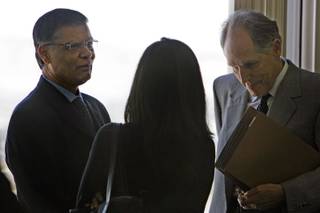Friday, Nov. 13, 2009 | 2 a.m.
Sun Archives
- Judge orders release of hepatitis case records (10-24-2009)
- Hepatitis case has escalating side battle (10-22-2009)
- Endoscopy plaintiffs target drug suppliers (10-13-2009)
- Desai says he didn't see or approve settlement (10-2-2009)
- Desai, ex-patient settle but other defendants remain in lawsuit (9-26-2009)
- Judge to decide on confidentiality order status (5-9-2009)
- Depositions kept from public gaze in hepatitis cases (7-31-2009)
- Desai, colleagues may take the Fifth, stalling lawsuits for years (5-14-2008)
- Clinic patients' choice: Recourse or privacy (5-10-2008)
- A push for open outbreak litigation (4-8-2009)
- Deadline spurs endoscopy lawsuits (2-28-2009)
Sun Topics
The massive assortment of lawsuits over last year’s hepatitis outbreak could be taking another detour.
A bankruptcy trustee is trying to route an overall settlement of claims against Dr. Dipak Desai and his endoscopy clinics through U.S. Bankruptcy Court.
Whether that move would benefit the 5,000 or so former patients suing Desai and the bankrupt clinics over last year’s hepatitis C outbreak depends on which lawyers are talking. One side says it will eat up $2 million that should wind up going to the patients.
But Dallas attorney Walter “Skip” Scott, who represents the bankruptcy trustee, contends that under the proposal, former patients — especially the roughly 300 alleging they were infected with the hepatitis C virus — would get a crack at $54 million to $60 million in available insurance money much sooner than they otherwise would.
A settlement would remove most of the medical personnel from the trial equation and put some money in the pockets of the former patients to tide them over while they pursue much larger product liability claims against deep-pocketed pharmaceutical companies in a streamlined civil litigation, Scott argues.
He expects to file court papers within the next two weeks outlining the “global” settlement plan, which would still need the approval of Bankruptcy Judge Mike Nakagawa.
Part of the trustee’s plan, however, involves asking Nakagawa to put an immediate hold on all activity surrounding the District Court trials of Desai and the other physicians and nurses who are being sued. A couple of those trials are slated for next spring.
Plaintiffs’ lawyers have fought previous efforts to stop the litigation from moving forward, and they view trustee Brian Shapiro’s proposed delay as one of several major flaws in his plan.
“I don’t think this is going anywhere,” said Will Kemp, one of the lead plaintiffs’ attorneys. “This is an insurance company. They’re not in this to do the right thing or help people out.
“Why would they turn around and just pay $60 million into Bankruptcy Court at this point? There’s absolutely no incentive for them to do so.”
Kemp said it would take a couple of verdicts finding liability and the setting of more trials to persuade the insurance company, Nevada Mutual Insurance, to sit down at the negotiating table.
“They won’t do it until they absolutely have to do it,” Kemp added.
Another lead plaintiffs’ lawyer, Robert Cottle, said there also are a number of defendants, primarily nurses, who can’t be brought into the settlement talks because they don’t have insurance with Nevada Mutual and aren’t part of the bankruptcy proceedings.
“Because all of the players can’t come to the table, all of the money won’t be put up on the table,” said Cottle, who is gearing up to try the first case in April.
He also said any attempt to delay his case “is an attempt to delay justice for all of the victims.”
The plaintiffs’ lawyers believe Shapiro and his attorneys are pursuing a Bankruptcy Court settlement only for their own financial gain. “Right now, there’s no money in the bankrupt estate to pay the trustee and his lawyers,” Kemp said. “Their only hope of getting paid is to get money that they can bill against, and that would be the insurance money reserved for the plaintiffs.”
If Shapiro and his team receive a customary 3 percent cut of $60 million for their work in Bankruptcy Court, that would mean $2 million less for the victims, Cottle said.
Scott, however, insisted that the move toward a settlement is necessary because infighting between the trustee and Nevada Mutual over how to pay for the multimillion-dollar hepatitis defense is spiraling out of control.
“It’s a way to bring order out of chaos, and chaos reigns supreme right now because of a lack of communication and information,” he said.
Shapiro and Nevada Mutual have been taking shots at each other in Bankruptcy Court papers in recent weeks.
Nevada Mutual, which has primary responsibility for the defense under the terms of its insurance policy with Desai and his clinics, thinks Shapiro and company are being uncooperative and needlessly running up defense costs at the company’s expense.
Shapiro thinks Nevada Mutual has been making his job more difficult by refusing to divulge exactly how much insurance coverage is available for the defense. Without such a figure, it is tougher for Shapiro to protect the financial interests of not only Desai’s clinics, but also their creditors, which include the plaintiffs in the civil litigation.
Scott said he knows that negotiating a global settlement through Bankruptcy Court is an ambitious idea, which likely will face opposition from both Nevada Mutual and the plaintiffs’ lawyers. But he is hoping that everyone will come around to seeing the benefits of working toward a deal.
“A lot of the underlying tensions will go away, and there will be a more constructive effort to get something done,” he said. “The alternative is to keep running on a treadmill.”


Join the Discussion:
Check this out for a full explanation of our conversion to the LiveFyre commenting system and instructions on how to sign up for an account.
Full comments policy